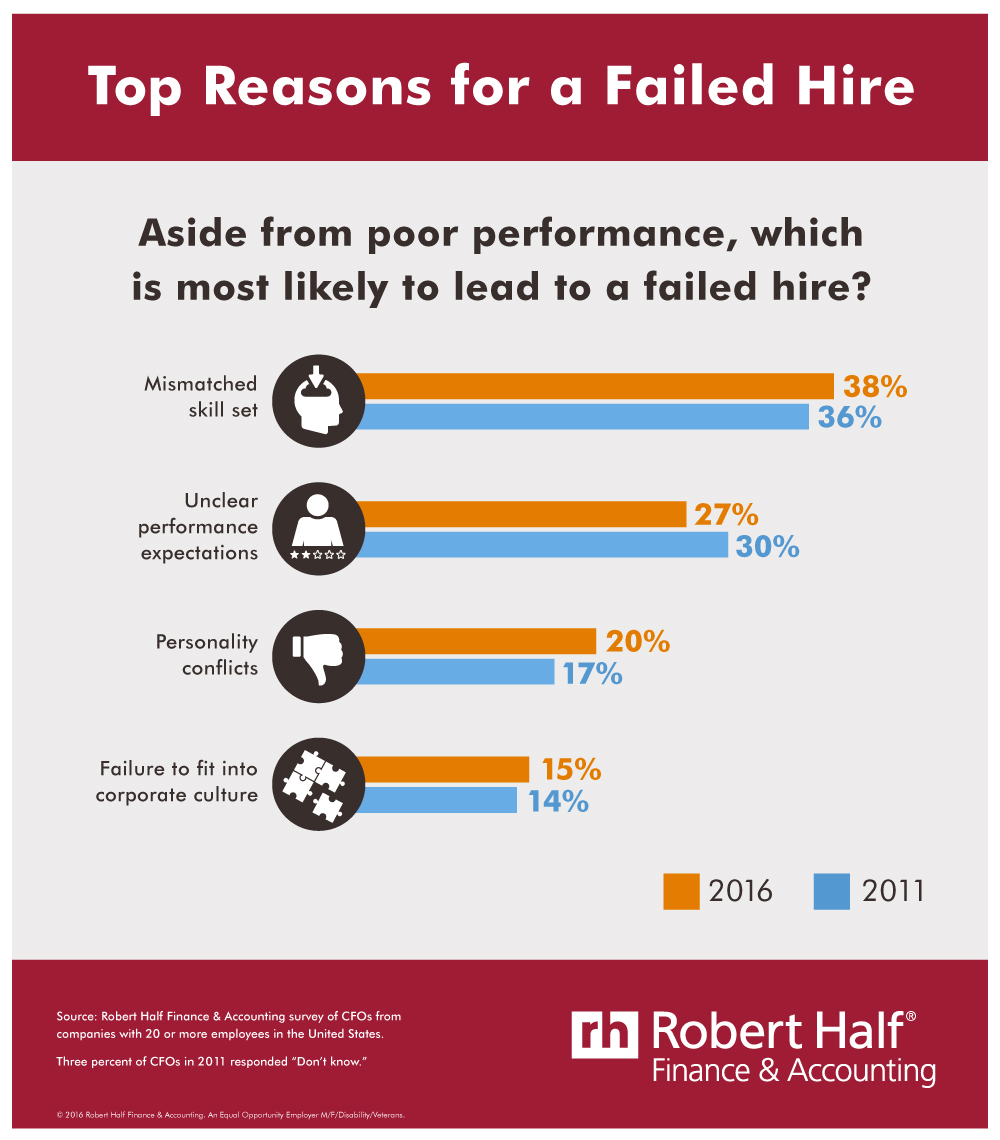The most common reasons for a bad hire? Aside from poor performance, it’s the result of a mismatched skill set. That’s according to new data from financial staffing firm Robert Half.
Nearly four in 10 CFOs interviewed (38 percent) responded this way, up two percentage points from a similar survey conducted five years ago. Another 27 percent of financial executives think unclear performance expectations is the top reason new employees don’t work out.
While executives at firms of all sizes cite a mismatched skill set as the leading contributor to hiring failures, CFOs at the smallest companies (20-49 employees) are more likely than their peers at the largest organizations (1,000 or more employees) to fault unclear performance expectations and personality conflicts.
CFOs were asked, “Aside from poor performance, which one of the following factors is most likely to lead to a failed hire?” Following are their responses by company size*:
|
Number of Employees |
Total |
20-49 |
50-99 |
100-249 |
250-499 |
500-999 |
1,000+ |
|
Mismatched skill set |
38% |
39% |
39% |
32% |
37% |
40% |
45% |
|
Unclear performance expectations |
27% |
26% |
26% |
32% |
26% |
36% |
21% |
|
Personality conflicts |
20% |
21% |
20% |
20% |
22% |
19% |
13% |
|
Failure to fit into corporate culture |
15% |
15% |
14% |
15% |
15% |
5% |
21% |
|
100% |
101% |
99% |
99% |
100% |
100% |
100% |
|
*Some responses do not total 100 percent due to rounding. |
“Hiring is hard enough, but it’s even harder when you have to do it twice,” said Paul McDonald, senior executive director at Robert Half. “Don’t impede your efforts by recycling old job descriptions. Develop a fresh overview for each opening, listing the skills required for candidates to be successful now and in the future.”
McDonald also advises companies to sell the sizzle when recruiting. “Promote why your business is a great place to work, emphasizing the organization’s mission, culture and career growth opportunities,” he said. “This, combined with a compelling, relevant job description, will help attract top performers who fit the firm’s needs.”
Robert Half Finance & Accounting offers four tips to avoid making a bad hire:
- Identify the must-haves. Make a list of essential skills and those that can be learned through training. While technical expertise can help people land the job, it’s their soft skills that ensure they’re a fit for the company and can take on greater responsibilities.
- Don’t shortcut the reference check. Talk to candidates’ former managers to get a better sense of whether employees might do well at your firm. Ask about individuals’ work styles, strengths and areas for improvement.
- Get outside help. By tapping the extensive networks of a specialized recruiting firm, you gain access to a larger talent pool. A recruiter can help evaluate each job seeker based on the required skills and performance expectations and accelerate the hiring process.
- Act immediately. If you find a great applicant, move quickly and offer attractive compensation. Separate Robert Half research shows promising candidates lose interest when companies delay making a decision. Don’t prolong the process.
Thanks for reading CPA Practice Advisor!
Subscribe Already registered? Log In
Need more information? Read the FAQs




